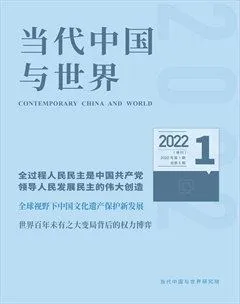英文摘要
Whole-Process Peoples Democracy: the New Model for Socialist Democracy
By Ai Silin (Professor, Dean of the school of Marxism, Tsinghua University)&Wang Guixian (Associate Professor of the school of Marxism, Tsinghua University) p.7
Abstract: Whole-process peoples democracy is a new form of socialist democratic theory with Chinese style, characteristics and ethos. Whole-process peoples democracy is the realization of socialist democratic theories, suggesting that it has solid theoretic foundations, i.e., the socialist democratic theory, and that the leadership of the Communist Party of China, economic growth, better rule of law and higher quality of the people have provided objective conditions for the realization of whole-process peoples democracy, turning socialist democracy from theory to reality. However, while implementing whole-process peoples democracy, it is still necessary to strengthen institutions on the basis of both observance and innovation, raise peoples awareness of political participation through education on democracy and on the rule of law, and make use of new technologies and platforms to increase participation in peoples democracy and sense of political involvement.
Keywords: whole-process peoples democracy; socialist democratic ideas; practice of democratic rule of law
The Chinese Creation of Whole-Process Peoples Democracy
By Tao Wenzhao (Professor, Deputy Dean of the school of Marxism, Renmin University of China) p.14
Abstract: In the face of the hegemony of Western democracy, China has stood firm on the value of democracy and created whole-process peoples democracy, answering the questions of democracy in a new era. Whole-process peoples democracy has rich contents, reflects the nature of the Communist Party of China and socialism, and is in line with Chinas history, culture and practical needs. In the new era, the CPC is committed to developing whole-process peoples democracy, promoting modernization and the great rejuvenation of the Chinese nation, and making Chinese contributions to the development of political civilization of all mankind.
Keywords: whole-process peoples democracy; China; socialism
Whole-Process Democracy in the Perspective of Democratic Development in the Contemporary World
By Zhang Shengjun (Professor, The Director of Global Governance Research Center, School of Government, Beijing Normal University)&Shen Youjun (Associate Professor of Global Governance Research Center, School of Government, Beijing Normal University) p.22
Abstract: This paper analyzes the current situation, problems and challenges of Western democracy from the perspective of development of democracy in the world, pointing out that Western democracy is not the end of history. The liberal democratic system equates democracy with election and puts freedom above democracy, exposing serious institutional flaws in the democratic development in Western countries. In the process of democratic development in the world, many non-Western countries regard the Western liberal democratic system as the only benchmark for democratic development, limiting their vision of democratic development. Whole-process democracy is the culmination of Chinas long exploration of an autonomous path of democratic development, which has opened new horizons of democratic development in the world and enhanced the confidence of countries in the world in their own path of democratic development. The authors argue that whole-process democracy has surpassed Western liberal democracy and will take up the torch of democratic development in the world, pushing it into a new historical stage. The dynamic view of democracy at the ontological level, the substantive view of democracy at the epistemological level and the positive view of democracy at the methodological level embedded in whole-process democracy have made significant contributions to theoretical innovation of the development of democracy in the world.
Keywords: whole-process peoples democracy, democratic development, democratic system, autonomous path
Two Concepts of Democracy and the Democratic Process in China
By Chu Jianguo (Professor, Dean of the College of Public Administration and Humanities, Dalian Maritime University) p.32
Abstract: The meaning of democracy is not complex and diverse. At the conceptual level, it can be divided into “democracy of the principle” and “democracy of the people”, or “democracy of the public” and “democracy of the majority”. The core meaning of democracy as a common human value is the realization of “public interests of the people”, which is a relatively consistent tradition in both China and the West. Modern Western democracy has however gradually departed from this goal, confining itself to the simple aggregation of individual wills and further restricting itself to the election of a small number of governing individuals by means of voting. The Chinese concept of democracy has always adhered to the core objective of democracy and has endeavored to organically combine the defense of public interests of the people with the expression of their specific opinions in the democratic process. In exploring this combination, this paper logically reveals the complementary relationship between the process of Party leadership and the process of popular participation, based on the “eight criteria” for evaluating democracy. In the process of adapting to new technological developments, China can use its political strengths to achieve better coordination between the defense of public interests of the people and the expression of their specific opinions.
Keywords: comparative politics; democratic politics; democratic theory; whole-process peoples democracy

